

Aku wa Sonzai Shinai
Japan 2023
Genre:
Drama
Director:
Ryusuke Hamaguchi
Cast:
Hitoshi Omika
Ryo Nishikawa
Ryuji Kosaka
Ayaka Shibutani
Hazuki Kikuchi
Hiroyuki Miura

Evil Does Not Exist

Story: Takumi (Hitoshi Omika) lives in the small town of Mizubiki and does all kinds of small jobs there. He is a man who feels connected to nature and he knows the region very well. One of his tasks is to fetch pure spring water for the local restaurant. Doing so, he usually forgets the time and is late to pick up his daughter Hana (Ryo Nishikawa) from school. Hana then starts walking home by herself, but her father usually catches up with her and on their way through the forest he explains the flora and fauna to her. One day, however, the small village's idyll is disturbed by a start-up company that wants to offer "glamping" in the village, a form of camping where you don't have to relinquish any luxury. Takahashi (Ryuji Kosaka) and Mayuzumi (Ayaka Shibutani) are representatives of a talent agency, and they are supposed to get into contact with the local residents in the name of the company. With a presentation and a subsequent Q&A session they try to win over the residents of the village. Nevertheless, the residents have some problems with the planned campsite that cannot be dismissed. Above all, the expected pollution of the groundwater is causing them quite a headache. Takahashi and Mayuzumi have to talk to their boss. But Takahashi starts to enjoy the quiet life in the village and thinks about building a new life there.





Review: After the first few minutes, in which the camera is pointed at the sky while it moves through a forest, it becomes already clear that this is a very leisurely-paced story. Then we watch for another few minutes as wood is chopped and spring water bottled. I'm not exaggerating when I'm saying that you could easily play this drama at twice its speed for long stretches of time, and you wouldn't miss anything important story-wise. But "Evil Does Not Exist" is also a movie that focuses on atmosphere and feeds off it. You have to respect that, but it also has to be said that people without patience will certainly fall asleep in front of the screen. I have to admit that I also had a hard time making it to the end. So, this already covers the biggest criticism of the drama, but there are also a few positive sides that the movie repeatedly shows off. For one thing, there is the beautiful cinematography and score, which makes a big contribution to creating a unique mood. Moreover, there is an ending that will leave many viewers quite puzzled, but on closer inspection, it becomes clear that seemingly unimportant scenes had already built up to this resolution.

Even though there might be a certain fatigue setting in pretty quickly, once you get used to the pacing, you will not only be rewarded with wonderful nature shots, which have something crystal-clear and realistic about them, but also with some directorial tricks. For instance, there is Takumi wandering through the forest while the camera travels parallel to him, and then he suddenly carries his daughter, with whom he has apparently caught up, on his back. We don't get to know the exact time when he caught up with her, though, as his shot gets repeatedly blocked by trees, which is used to compress time here - contrasting the rest of the drama. Because otherwise, the movie even takes its time to attach the camera to the rear bumper of Takumi's car without cutting. So, you just have to endure the subsequent wobbling. Generally, you shouldn't have any problems with a shaky hand-held camera, because there are several occasions in which the camera follows the protagonists, even though it luckily never gives off documentary vibes. Nevertheless, the shakiness still contrasts the wonderful image composition.
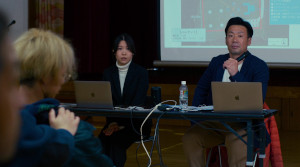
While you first believe that Takumi will stay our only reference point, this changes in a key scene. The real plot is the discussion of the glamping project in the community hall. There, the residents of the small town express their concerns and it becomes clear that water and untouched nature is something they want to protect collectively, also because their own existence is largely tied to it. So, it's about the arrival of strangers who disturb the existing idyll and threaten to change everything. With Takahashi, however, we also get someone who has grown tired of life in the city and has actually reached an impasse. Life in the small town would offer him a new beginning, which is something he desperately wishes for, even though it might just be unconsciously at first. When he talks with his colleague about this and that during a long car ride, we actually learn more about him than about Takumi. We remain in the dark about Takumi, who is a very quiet fellow, until we start organizing his actions into a pattern and choose to interpret them as signs of his character.
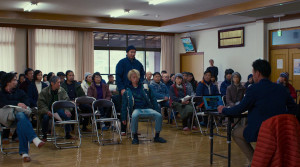
Again and again, the protagonist forgets to pick up his daughter from school. So, he is probably not the best father, but on the other hand, he patiently explains nature to her. He is also very skeptical about the arrival of the strangers, but at the same time, he is also a bit more open-minded than you would expect. You get to know a few other residents of the village too. Even though we learn little about their individual characters, all this still manages to paint an overall picture of the village and its people. This is important if you want to understand the ending and Takumi's plot. Because the change seems to be working towards a catastrophe. This is also made clear by Eiko Ishibashi's soundtrack, which seems to symbolize a dark omen, repeatedly hinting at the fact that something bad will happen. How bad things will get, stays unclear until the end, though. But this foreboding makes us perceive the occasional shots of the hunters that can be heard in the background differently and also puts Mayuzumi's small injury caused by a shrub in a completely different context. Nevertheless, you have to make a real effort not to be left utterly puzzled at the end.

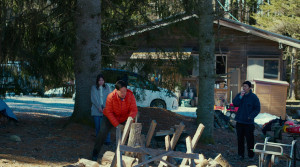
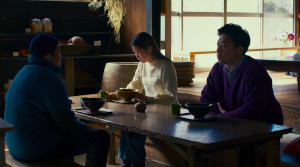

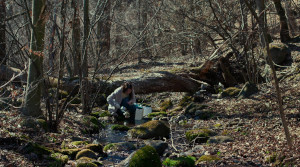
Originally, the director only wanted to show the movie as a half-hour work without dialogue but with a live soundtrack. With "Evil Does not Exist" the story has turned into a 106-minute drama, though, which is simply too long. Nonetheless, if you are able to warm up to the pace of movies like "Village", you certainly will be able to take something away from this one too. Ryusuke Hamaguchi has already received Oscar nominations for Best Director and Best Adapted Screenplay with "Drive My Car", but the pacing of "Evil Does Not Exist" kind of put me off watching his three-hour long work. So, that's where you have to be honest to yourself. Critics praise the movie in the highest way possible, which is only justified when it comes to its lyrical atmosphere, but most viewers will find "Evil Does Not Exist" too slow. And the ending will not be able to appeal to everyone either. For this reason, I will step out of line a little bit and choose not to recommend the movie unconditionally, despite its sometimes enchanting - also in a somewhat gloomy way - atmosphere.

Disclaimer










